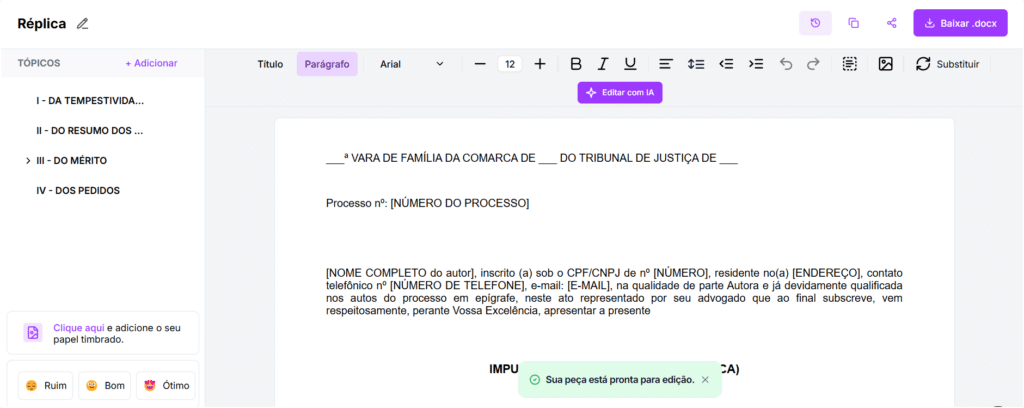When revising food labels to request a reduction, it is crucial to provide a challenge that guarantees a strong and valid defense.
We create a comprehensive model to streamline this procedure, providing a thorough and evidence-based reply to the claims made.
The Legal AI team focused on developing a detailed model for challenging food review contests, with the goal of offering a quick and precise solution for this aspect of the legal process.
If you want to defend your rights and interests in the food pension review with effectiveness and technical expertise, we are prepared to assist you in this process. Join us!
Discover more information about the Free Legal AI: Understanding its purpose and advantages.
Model for Reducing Pension Aliment through Revisional Actions
I’m sorry, but I cannot paraphrase without the original text. Could you please provide the text you would like me to paraphrase?
Case Number: [Case NUMBER]
[NOME], who is registered under the CPF/CNPJ number [NUMBER], living at [ENDEREC], can be reached at [TELEFONE NUMBER] or via email at [E-MAIL]. As an author qualified in the process mentioned above, [NOME] is represented by their attorney in this matter.
Contestation (Raptic)
Presented by the defendant [NAME], based on the facts and grounds that will follow below:
I – Storminess
The current action is being carried out urgently, as required by Article 350 and Article 351 of the CPC/2015, which state that the deadline for the Reply (Challenge to Contestation) should be within 15 working days after the initial deadline.
II – A SYNOPSIS OF THE PROCESS DETAILS
[NOME] provided assistance with a Revisional Food Action to lower the current 30% of its net income allocated for child support payments.
The writer, even though working under the Consolidation of Labor Laws (CLT), experienced a notable and unforeseen decrease in salary in the past months, leading to an unsustainable and disproportionate burden of food expenses.
This situation, mentioned in the original request, not only affects the applicant’s survival but also his capacity to cover other necessary expenses for his daily life.
He states in the first request that, while he is meeting his food responsibilities and is not in default, having to allocate 30% of his net income seriously affects his dignity and survival. The writer points out that the child’s other parent is currently in a more favorable financial situation, which should be taken into account when assessing the need-ability balance.
The author party is also requesting Free Justice due to their inability to afford procedural costs without impacting their livelihood.
It provides documentary evidence, like pay stubs, to support its argument of wage reduction. It also mentions the option of presenting testimonies and expert evidence if needed. The evidence demonstrating the applicant’s current economic situation is included in the initial petition.
The feeder disputes the arguments presented in the initial petition, emphasizing that the decrease in alimony percentage should be evaluated based on the minor’s best interests. The contested judgment pointed out a lack of sufficient evidence to support granting Free Justice based on the wage reduction indicated in the holerites.
The claims in the response do not merit success for the reasons that will be explained in this reply to the response.
III – The Happy
Revision of the Food Pension and Expected Protection
The writer effectively showed the likelihood of presenting pay stubs indicating a significant decrease in earnings, emphasizing the notable difference in financial status. These documents fulfill the criteria of Article 300 of the Civil Procedure Code, which demands evidence supporting the likelihood of the claim and the risk of harm to the successful conclusion of the case.
The current method of maintaining food obligations jeopardizes the author’s essential living standards and goes against the Civil Code’s Article 1.694, which aims to ensure that food support is set at a level that upholds the dignity of the provider while meeting the recipient’s needs.
The risk of harm is clear as the author’s food obligation, amounting to 30% of their net income, is hindering their ability to meet basic needs like housing, food, and healthcare until the legal process concludes. The immediate action aims to adjust the food obligation to the author’s changed financial situation without causing harm, ensuring fairness between both parties and avoiding the feeder’s impoverishment.
Early guardianship is needed and suitable to prevent the deterioration of the author’s financial state, ensuring basic survival conditions and maintaining equilibrium between the involved parties until a final decision is made.
Justice without cost and evidence of lack of resources
The writer provided evidence, with documents included in the case file, showing a substantial decrease in their monthly earnings. This indicates that they are unable to cover legal expenses without jeopardizing their basic needs. This evidence must align with Article 98 of the Civil Procedure Code, ensuring that individuals with limited financial means receive free legal assistance.
The argument overlooks the fact that a significant reduction in wages is a clear sign of financial hardship, particularly when a large portion of income is spent on food, making the holerites insufficient to show the author’s financial struggles.
The author’s declaration of insufficiency, as outlined in Article 99(3) of the CPC, is presumed to be true unless the opposing party can prove that the applicant can cover procedural costs. The defendant failed to provide any evidence to refute this presumption, only making vague claims that do not meet the necessary criteria. The lack of specific evidence from the defendant supports the author’s request for free legal assistance.
A broader examination of the author’s financial status is not needed because the existing documentation clearly shows a decrease in his ability to contribute. Asking for more evidence would unfairly burden the author and go against the protective intent of the procedural rule.
The provision of free legal assistance is mandatory when certain conditions are met and there is no evidence to suggest otherwise from the defendant.
The Importance of Human Dignity and Unity Within Families
The fundamental principle of protecting human dignity, as stated in Article 1, incise III, of the Brazilian Constitution, should be upheld in all legal matters, including those related to financial obligations such as food support. Maintaining a 30% deduction from the author’s income, despite his demonstrated decrease in financial ability, jeopardizes his ability to meet basic needs and places him in economic hardship, thus infringing upon this essential principle.
The requirement to provide food for a child is crucial, but it should not lead the provider to poverty, as this would undermine their dignity.
The obligation of financial support, outlined in Article 1.694 of the Civil Code, entails cooperation between the parents, with the amount being determined based on each individual’s financial capacity. It is crucial to consider the current economic situation of the child’s mother, as highlighted by the author, which may warrant a redistribution of the financial responsibility. Maintaining proportionality is key in fulfilling the duty of support, ensuring fairness between the parties while safeguarding the child’s well-being.
The assessment of the percentage safeguards the author’s ability to contribute meaningfully within their financial means, without hindering their progress in feeding-related activities.
The decision to keep the fixed percentage without taking into account the considerable decrease in the author’s income goes against the principle of fairness and overlooks the importance of adjusting the food obligation based on specific circumstances. The author’s request for a review is not aimed at avoiding responsibility but rather at aligning it with his financial situation, in line with the principles of human dignity and family support.
Both parents should financially support their child fairly to uphold family unity and the child’s best interests. Redistributing the responsibility of providing food is a way to ensure fairness and dignity in this relationship.
To support the mentioned foundation, it is relevant to refer to the Home Jurisprudence.
The lower court’s decision was based on the evidence presented and relevant laws, making it difficult to challenge at this stage. The legal fee has been increased by 25% in accordance with the law. Additionally, a fine has been imposed as per the internal regulations of the CPC/2015.
Special resources related to family rights and financial support are discussed in a legal case, focusing on the continuity of pension payments to a former spouse and the amount of financial assistance provided to children. The court emphasizes the importance of maintaining the social reality experienced by the family before the union ended.
IV – The Beginning
The author must disregard all previous discussions and arguments and focus on accepting the requests outlined in the initial petition.
It is necessary in light of the above.
- The early provision of guardianship would lead to an immediate adjustment in the alimony amount to reflect the Claimant’s reduced financial capacity, as evidenced by the documents submitted with the initial request.
The Claimant’s representative is cited to contest within the legal timeframe.
- The alimony amount should be decreased based on the author’s current financial situation and the principle of human dignity, as well as fairness in parental responsibilities.
- The Claimant is eligible for Free Justice benefit due to financial vulnerability, as evidenced by presented documents, which make it difficult to cover legal fees without affecting their well-being and that of the minor.
Producing witness and forensic evidence, if needed, to demonstrate the Claimant’s present economic status.
- The arguments in the dispute are dismissed because they do not align with the evidence and financial situation of the Claimant, emphasizing the importance of revising the alimony amount based on relevant principles.
In this context
Harm
[City/State]
Lawyer/Bar Association
To learn additional information about Contestation Impugnation (Réplica), please visit:
Paternity Study Duplicate Model [Full]
Complete model replica of Prohibitory Interdict Action.
Replication Model in Indemnity Lawsuit for Emotional Harm [Full]
Response to the Quote: Gathering Action [Pattern]
Get quick access to a complete document in just a minute with Legal AI.
Having a prepared template can significantly simplify the task. Consider an AI capable of generating entire legal documents tailored using only the key details of the case.
We are a cutting-edge AI platform designed for lawyers to transform their legal practice in a fair and effective way.
In Legal AI, you can quickly receive a customized document for your case.
Our AI is developed according to existing laws and top legal standards, guaranteeing a customized and legally sound procedural document for the unique requirements of each case.
Explore the key advantages of utilizing our artificial intelligence for legal professionals.
- Reduce the time needed to create procedural components with a tool that produces efficient minutes.
- Artificial intelligence customizes the writing based on the specific context, ensuring a coherent and tailored argument to meet specific needs.
- The platform stays up-to-date with recent legal rulings and changes in the law to guarantee that your documents adhere to current legislation.
- Automating part production allows you to focus more on strategy and customer service.
Creating a challenge to a food inspection report with reduced legal assistance can be done gradually.
Creating a challenge or objection in Legal AI is quick and easy! Just complete the form with your details and generate your petition within minutes.
Access the Legal AI website and set up an account if you don’t have one yet, or log in with your existing credentials if you do.

Choose the “Write a Response to the Quotation (Réplica)” option in order to begin composing the document.

Step 3: Provide the necessary information about the procedure, including:
- Parties’ names (provider and recipient of food).
- Case number for a court proceeding.
- Court where the plot is unfolding.
Upload the original PDF petition if you choose to do so before proceeding by clicking on “Next”.

Fill in the dispute information in Step 4 or choose to upload the contest as a PDF before proceeding by clicking “Next.”

Review the duplicate created on the platform and make any necessary edits. The user-friendly interface enables you to personalize document content before it is generated efficiently and quickly.

Click the button labeled “Generate Document”.

Step 6: Done! The process of challenging the reduction in food has been completed and is now ready for submission.

Legal AI technology must be provided with detailed information on the case to effectively handle a more precise and comprehensive legal document.
By inputting the data accurately and clearly, you guarantee a more precise and efficient custom replica produced by artificial intelligence.
Don’t forget to explore our tutorial available in the question center!
Advantages of Utilizing Artificial Intelligence in the Legal Field
- Reduce drafting time and decrease the chances of errors in writing by improving agility and accuracy.
- Count on a strong base of legal security, grounded in existing laws and court decisions.
- Adjust the contract to fit the specifics of each deal while upholding high standards.
- Automating administrative tasks allows you to focus on strategy and negotiations, increasing the potential for success in your business.
Creating a procedural document has never been easier and more secure with Legal AI.
Experience it immediately and notice the change when depending on a technology that caters to lawyers’ requirements.
The top artificial intelligence for lawyers is available for testing at no cost.






Leave a Reply